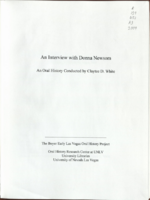Search the Special Collections and Archives Portal
Search Results

Transcript of interview with Helen Cecil by Susan Vogel, March 16, 1978
Date
Archival Collection
Description
On March 16, 1978, Susan Vogel interviewed Helen Cecil (born November 4, 1916 in Silver City, Utah) in her home in Las Vegas, Nevada. She relocated to Las Vegas with her parents for health reasons. This interview covers family life, education, employment and the growth and development of Las Vegas. Helen attended Las Vegas High School and then went on to work at the Las Vegas High School for many years, an accomplishment that she is extremely proud of. During the interview she also mentions the Boulder Dam, the Old Ranch, and the Westside.
Text

Transcript of interview with Alice Doolittle by Christopher Moran, March 21, 1977
Date
Archival Collection
Description
On March 21, 1977, Christopher Moran interviewed Alice Doolittle (born 1897 in Boston, Massachusetts) about her experiences while living in Nevada. Also present during the interview is Ruth Belding, Alice’s daughter. Doolittle first talks about her reasons for coming to Las Vegas and her eventual occupation as a dental assistant. She also talks about her family’s history of living on the Stewart Ranch and the ranch’s swimming pool that attracted many during the summers of Las Vegas. Doolittle also describes her move to Boulder City with her husband, the first theaters in Las Vegas, and the Union Pacific Railroad. At the end of the interview, the three discuss Helen Stewart, Harley Harmon, and the Doolittle Center, named after Doolittle’s late husband, Ferris Doolittle.
Text

Transcript of interview with Dorothy George by Claytee White, October 13, 2003
Date
Archival Collection
Description
After serving as a nurse in World War II in Hawaii, Okinawa and Japan, Dorothy returned home to Chippewa Falls, Wisconsin. She experienced a particularly bad winter and she set out for California but stopped in Las Vegas to visit the family of her traveling companion, a girlfriend from her home town. The girlfriend returned to Wisconsin and George applied for a nursing license and got it within three days. She never left. Dorothy met her husband while working the night shift at Clark County Hospital. He would come in regularly to assist his patients in the births of their babies. Their occupations and their service in World War II drew them together in a marriage that has lasted over fifty years. From 1949 to this interview in 2003, Dorothy George has seen Las Vegas grow from a town that she loved to a metropolitan area that is no longer as friendly. She reminisces about the Heldorado parades, family picnics at Mount Charleston, watching the cloud formed by the atomic bomb tests, raising six successful children, leading a Girl Scout Troop, and working in organizations to improve the social and civic life of Las Vegas.
Text

Transcript of interview with Kimberly Harney-Moore by Claytee White, June 16, 2010
Date
Archival Collection
Description
Kimberly Harney-Moore and her three siblings were raised in the John S. Park Neighborhood in the 1960s and 1970s. Their parents, Tim and Kathleen Hamey, were educators. A nostalgic feeling for the neighborhood remains; perhaps, rekindled when she had close friends buy a house across the street from her childhood home. In this interview, Kimberly talks about the inviting character of the area's architecture, mentions a few names of neighbors she babysat for, and fondly recalls her job at Luv-Its Custard shop. There was a time when she would drive through the old neighborhood and be saddened by the lack of upkeep and the changes, but today it is a place being reborn to a new generation. Note: Tim Harney and Kathleen Harney, Kimberly parents, are also participants in the Voice of the Historic John S. Park Neighborhood oral history project.
Text

Transcript of interview with Donna Newsom by Claytee White, June 11, 2009
Date
Archival Collection
Description
Donna Newsom shares the history of her life in great detail, beginning with her childhood in Georgia and Florida. The family moved many times, following her father's work opportunities. Donna had a close relationship with her father and recalls the many daring adventures on which he took her. After graduating from high school, Donna earned a nursing degree at the Macon Hospital School of Nursing. She remembers dorm life, long hours, and the specific training nurses received in the late forties. Her career began at age 19 with a year of working at Macon Hospital as a graduate nurse, and then she made plans to leave the South. Donna's memories include moving to Houston, living in a boarding house, her first date, and working at Hermann Hospital and then Methodist Hospital. She then answered an ad to work at a Girl Scout camp in Colorado, and her roommate there became a mentor and one of her staunchest supporters. With help from her mentor, Donna went on to earn a teaching degree in Austin, Texas, met and married her husband Sam Newsom, and got involved in real estate. She relates the many experiences they had during Sam's Navy career, her teaching experience in New Orleans, and their eventual move to Las Vegas. Sam and Donna loved Las Vegas from the moment they moved here. She recalls many details of her employment at UMC, the differences in health care compared to down south, and the feeling of being safe no matter the time of day or night. Donna stays active in tutoring, the OLLI program at UNLV, and working for the Salvation Army women's auxiliary. She and Sam also get together with his golfing buddies and their wives for dinners in their various homes.
Text

Transcript of interview with Robert & Patricia Campbell by Stefani Evans, November 28, 2017 & March 1, 2018
Date
Archival Collection
Description
In 1976, when Bob Campbell accepted the city manager position in Henderson, Nevada, he and his family had just endured nearly a month of sub-zero temperatures in their native Missouri. Southern Nevada's mild winter coupled with the promise of developing the 8,600 acres that would become Green Valley convinced Bob and his wife, Pat, to make the move. Bob came to Henderson with a degree in public administration and city manager experience in two Missouri towns, but Green Valley offered something akin to "an artist having a blank canvas on which to plan and create." In this interview, Bob talks about the ways his career in public administration blossomed in Southern Nevada. After about five years with the City of Henderson, Campbell joined Mark Fine and American Nevada Corporation to develop Green Valley; five years after that, he moved to Southwest Gas Corporation to work with Bill Laub and later, Kenny Guinn. From about 1989 to 1997, he helped develop Lake Las Vegas. In 1994, Bob and Pat together formed The Campbell Company, a private consulting firm whose clients included Transcontinental Properties' Lake Las Vegas project as well as Henry Chen's Ascaya. v Much of the interview focuses on the Lake Las Vegas project: its original visionary, false starts, and its tumultuous development as an arm of the Bass brothers of Fort Worth, Texas; their developer, Ronald Boeddeker of Transcontinental Properties in Santa Barbara, California, and Boeddeker's appointee, Alton Jones. Along the way Campbell shares the strategies employed by the Wednesday morning group of Henderson boosters who met at Saint Peter's Catholic Church and who succeeded in gaining the necessary local, state, and federal approvals to move the project forward. He reveals the intimidation, physical threats, and sexual harassment suffered by those who questioned the way Jones did business. Overall, though, he explains why he continues to respect the Bass brothers and is still proud of Lake Las Vegas, "proud that we got it on, and proud that it's turned out to be what it is."
Text

Transcript of interview with Kim Bird & Pam Fogliasso by Claytee D. White, February 8, 2013
Date
Archival Collection
Description
Kim Bird's family moved to Las Vegas in 1955 when she was twelve years old. Pam Fogliasso arrived in 1954 with her family in 1954, when she was ten. Kim married and had a son and a daughter; she lives in Las Vegas. Pam married, had two children, and lives in Parumph, Nevada. Though Kim and Pam moved here in the mid-1950s, they had family members who had lived in Southern Nevada and worked on building Hoover Dam - Kim's grandfather and Pam's great-uncle. Both women remember growing up in a Las Vegas that was run by the mob and safe for teenagers; meeting friends in local hangouts such as the Blue Onion and attending sock hops, babysitting, and cruising down Fremont Street. They attended high school with black students but were also aware of the segregation that existed on the Strip. This interview focuses on Kim and Pam's experiences growing up in Las Vegas, and on their teenaged years attending Rancho High School.
Text

Transcript of interview with Florence McClure by Joanne Goodwin, January 24, 1996 & February 6, 1996
Date
Archival Collection
Description
Florence McClure came to Las Vegas later in her life, but the state felt her presence and the community her contributions as if she were a native daughter. Introduced to the League of Women Voters in 1967, McClure met her political mentor Jean Ford and learned how to practice the core elements of democracy. She put those tools to work in a number of ways, however her participation in the creation of the Rape Crises Center and her advocacy for locating the women’s prison near Las Vegas are two of her long-lasting efforts. Florence Alberta Schilling was born in southern Illinois where she enjoyed the security of a tight-knit family and the independence to test her abilities growing up. She graduated from high school and attended the MacMurray College for Women at Jacksonville. With the attack on Pearl Harbor in 1941, she began a series of jobs working for the war effort. She moved to Ypsilanti, Michigan with a girlfriend to work at the Willow Run Army Airbase and then moved to Miami, Florida where she worked for the Provost Marshall in the Security and Intelligence Division. She met her husband, James McClure, at the time and they married in 1945. During the next several years, they raised a family and moved around the country and to Japan with the military. McClure came to Las Vegas in 1966 as part of her work in the hotel industry which she engaged in after her husband’s retirement from the military. She had worked in California and Miami Beach, but it was Burton Cohen in Los Angeles who invited her to join him in a move to Las Vegas to build the new Frontier Hotel and Casino. Following the completion of the Frontier, she moved to the Desert Inn with Cohen in 1967 and worked as the executive office manager. After a few years, she decided to leave the industry and complete her college education. She graduated from UNLV in 1971with a BA in Sociology with an emphasis on criminology. She was 50 years old. McClure had been a member of the League of Women Voters for a few years at that point and had learned the political process from Jean Ford and workshops on lobbying. She had numerous skills that were waiting to be tapped when she attended an informational meeting on the incidence of rape in the Las Vegas valley. From that meeting, a small group of individuals, including McClure, began the organization Community Action Against Rape (later renamed the Rape Crisis Center) in 1973. It was the first agency in the area devoted to serving individuals who had been assaulted and changing the laws on rape. The organization’s first office was set up in McClure’s home. Over the next decade, she worked to change attitudes and reshape policy by constantly raising the issues of sexual assault with police officers, emergency room doctors, judges, and legislators. Her role as an advocate took her into hospital emergency rooms and courtrooms to assist victims. It also took her to the state legislator to lobby repeatedly for a change in laws. During this period, journalist Jan Seagrave gave McClure the nickname “Hurricane Florence” - a fitting moniker that captured the force with which McClure attacked the issue. As a result of her efforts and those of the people with whom she worked, we now 1) recognize rape as a crime of assault; 2) forbid the sexual history of a rape victim from being used against her in court; and 3) recognize marital rape. In addition to learning about Florence McClure’s activities, the reader of this interview will gain information on the role of civic organizations like the League of Women Voters in engaging the voluntary efforts of women in the post-war years.
Text

Transcript of interview with Myra Berkovits by Barbara Tabach, August 21, 2014
Date
Archival Collection
Description
Interview with Myra Berkovits by Barbara Tabach on August 21, 2014. In this interview, Berkovits talks about growing up and starting her teaching career in Chicago. When she moves to Las Vegas, Berkovits eventually purchases a dining concierge business, but returned to teaching, and is now involved with the Sperling Kronberg Mack Holocaust Resource Center.
Myra Berkovits was born Myra Mosse in 1944 in Chicago, Illinois. She became an elementary school teacher in Chicago before moving to Las Vegas in 1980. Myra has made contributions to Las Vegas in the public and private sectors. She owned several businesses then returned to teaching, heading to the University of Nevada, Las Vegas (UNLV) to renew her teaching license and later received her master's degree. After a year of teaching in multicultural education, Myra was then in charge of the school district's homeless program, seeing its growth from serving 1,200 to 6,000 students. Myra's other passion was for Holocaust education and she became one of six interviewers in the city for the Shoah Foundation, documenting survivors' stories. One interviewee, David Berkovits, would later become her husband of fifteen years. Myra's own Holocaust education was aided by powerful trips to Israel and Poland. She used these experiences to develop and lead student-teacher conferences and classroom curriculum for the whole state. Myra still serves at the Education Specialist at the Holocaust Resource Center.
Text

Transcript of interviews with Al Levy by Cheryl Caples, February 23, 1979 and by Martha Zehnder, March 8, 1981
Date
Archival Collection
Description
Part I: Interview with Al Levy by Cheryl Caples on February 23, 1979. At the time of this interview, Levy was serving on the city commission (now the Las Vegas City Council). He talks about growing up in Las Vegas and attending Las Vegas Grammar School (Fifth Street School) and Las Vegas High School. He mentions the Helldorado events, recreational activities, and raising a family in Las Vegas. Part II: Interview with Al Levy by Martha Zehnder on March 8, 1981. Levy recalls much of the same information as the previous interview, and again talks about his schooling and attending the University of Southern California. He returned to Las Vegas to assist his father with his grocery stores. Levy talks about the polio epidemic as the reason that children were not allowed to swim at public or hotel pools. He discusses his real estate firm, Levy Realty Company, his involvement in the community and the Jaycees (Junior Chamber of Commerce), and the booming hotel industry. Levy also discusses some city leaders he's known, including Mayor Gragson. He talks about his Jewish faith and having to go to Los Angeles to train for his bar mitzvah because there were no rabbis living in Las Vegas.
Text
